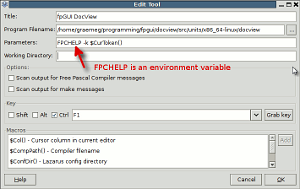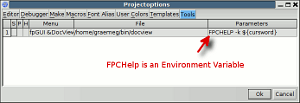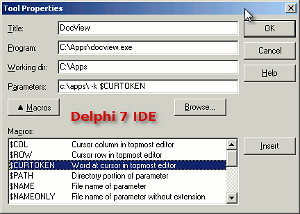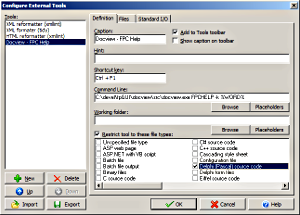External Tools feature
of each IDE or programming editor. Alternative methods exist (like in the case
of Lazarus IDE), but that requires recompiling the IDE - and that seems like just
to much effort.
If you don't have DocView yet, you can compile DocView yourself from the fpGUI
source code, or opt to download pre-built binaries of DocView and various INF
documentation, by visiting these links:
Lazarus
The first example uses an environment variable FPCHELP which
lists the INF help files you want DocView to use. How you setup environment
variable depends on your operating system. For more details see the docview.inf
help file, included with DocView.
Here we also setup the Ctrl+F1 keyboard shortcut to trigger loading DocView.

Using DocView via an environment variable.
The second example makes use of the global BOOKSHELF or
HELP environment variable that DocView automatically searches.
We then simply supply a concatenated list of INF help files (no need to include
their file extensions) DocView should use.
Also note that in this example we decided to use the F1 keyboard
shortcut, so remember to disable the default F1 shortcut assigned in Lazarus's
Environment Options dialog.

Using DocView and various INF file names concatenated.
MSEide
As in the first Lazarus example, here we are using a custom FPCHelp
environment variable that points to any FPC related INF help files. The value of the
environment variable can be a directory or a concatenated list of INF help files.

Using DocView via an environment variable.
Delphi 7
In this example we simply decided to point DocView to the c:\apps\ directory and
let it use all INF files it finds in that directory.

Using DocView via an environment variable.
EditPad Pro 7 (all purpose text editor)
As in the first Lazarus example, here we are using a custom FPCHelp
environment variable that points to any FPC related INF help files. The value of the
environment variable can be a directory or a concatenated list of INF help files.

Using DocView via an environment variable.





